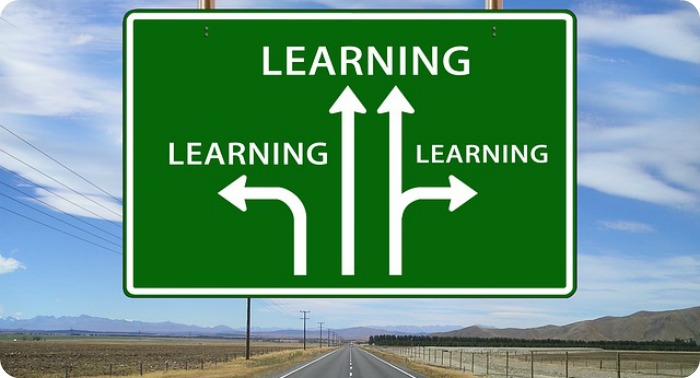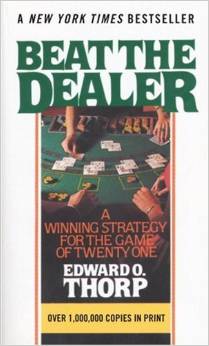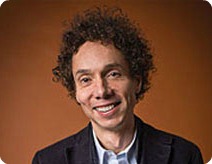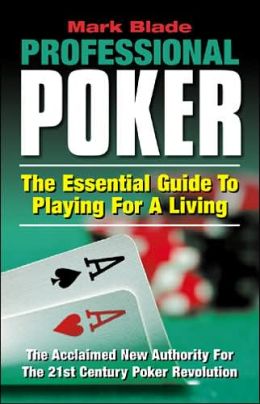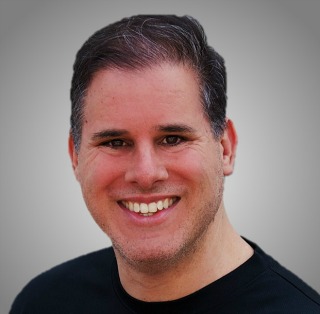
Welcome! I’m so glad you’re here!
HI! I’M MARK BLADE,
THE SELF HELP MENTOR.
I’m extremely pleased that you have discovered this site. An extra special welcome is in order as you are among the inaugural visitors. Please know that a continuous stream of material is in the pipeline which will be released regularly for the foreseeable future.
So I hope this site becomes an important and beneficial addition to your life. I suspect that it will.
I’m also very flattered that you are interested in learning more about it and me.
Over 30,000 people have paid for my advice, but on this website/blog, I give it away to you for free.
Before I wrote this page, I read some recommendations that an “About” page should always be nice and short. Here’s the first thing you should know about me, which also happens to be good self-help advice.
I don’t always follow the “conventional rules.” And neither should you.
So this “About” page is going to be as long as I want it to be, but please feel free to skim to the parts you are most interested in. My feelings won’t be hurt. 🙂
I will share four things with you here.
- An overview of what SelfHelpMentor.com is.
- An overview of what you can expect to get here. In other words, how this personal development website and blog will enhance your life.
- A more detailed sampling of the specific sorts of lessons you can expect to learn here.
- A very detailed bio that will reveal many personal details about my life (warts and all), and will also explain why I believe I’m ideally suited to teach you valuable personal development lessons.
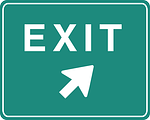 But before we begin, let’s discover if you even need to be here or if you would be better served spending your time elsewhere. (Hey, when has a site ever suggested that maybe you should leave? Hmm, maybe this self-help website is different.)
But before we begin, let’s discover if you even need to be here or if you would be better served spending your time elsewhere. (Hey, when has a site ever suggested that maybe you should leave? Hmm, maybe this self-help website is different.)
Here are some questions that reveal the types of people that this website is specifically designed for:
- Do you have dreams or goals, but you just can’t seem to get yourself to pursue them in a serious way? The reasons for this can include feeling overwhelmed by the enormity of them, fearing failure, or fearing criticism and judgment.
- Do you have an artistic soul but very thin skin? Are you a current or aspiring writer, blogger, actor, singer, musician, painter, designer, YouTuber, Podcaster, or any other type of creative person and yet you are paralyzed or severely slowed down by your fear of criticism, judgment, or embarrassment?
- Do you have the soul of an entrepreneur but lack the courage to get your endeavor off the ground, lack the discipline to persevere through difficult times, or simply lack the wisdom to know when to change course?
- Are you regularly thinking about what others are thinking about you, and imagining that they are constantly judging every aspect of you?
- Are you always comparing yourself to others, including their looks, careers, relationships, how much money they have, their clothes, cars, homes, etc.? Are these constant comparisons making you less happy?
- Do you lack self-esteem? Do you long for the successes that others enjoy but believe that you are not capable (or somehow not “good enough”) to ever achieve them?
- Do you feel like you are not living up to your fullest potential?
- Do you know what you should be doing, but constantly find yourself procrastinating, being easily distracted, occupying yourself with low-priority activities, or just being downright lazy?
- Do you struggle with personal finances? Do you spend more than you earn? Or, if you are someone who manages to save some money, do you feel so overwhelmed by investment choices and your lack of knowledge that you don’t even know where to get started; so instead you do nothing?
- Do you feel like your to-do list is never done? Like you are never catching up?
- Are you constantly stressed-out and not able to relax or enjoy any free time because thoughts of what you should be doing, or what you need to do next, are always racing through your head?
- Do you struggle with developing healthier habits?
- Do you struggle with relationship issues?
- Do you feel like your life is in a rut? That you lack more joy, fun, excitement, or happiness?
- Are you unsatisfied with your current career or lack thereof? Do you struggle with the decision of whether or not to quit your job, whether to go (back) to college, whether to take a riskier career path or a safer one?
- Do you worry about aging? Do you worry that it’s too late to pursue an exciting dream? Do you fear that all the great opportunities of life are passing you by?
- Do you ever feel inadequate or dumb, or that everyone around you is smarter, better educated, more informed, or more sophisticated?
- Do you feel like you have been putting your better future life on hold for too long, and that if you don’t make a radical life change soon, you never will?
 If you answered “YES” to any (or all) of the questions above, then Self Help Mentor is definitely for you.
If you answered “YES” to any (or all) of the questions above, then Self Help Mentor is definitely for you.
In fact, its entire design and purpose is to help you to solve these exact sorts of problems.
Now, here are some questions that will help determine if Self Help Mentor is NOT for you:
- Do you need lots of personal hand-holding or one-on-one interaction to learn things? Although I may offer some form of personal mentoring in the future, I do not now, and I may never. (I suppose if someone made me an offer I couldn’t refuse, I might reconsider, but at least for now, this is not an option.) So if you need that, or you need a self-help instructor who definitely responds to your every email, comment, or Tweet, I may not be your guy. Let me explain why. It’s not that I don’t care about you. To the contrary, I care very much about helping you (and others like you). It’s just that the best way I can think of doing so with the finite time that I have available is to help as many people as I can simultaneously, instead of one-by-one. This also requires extensive research, not to mention preserving the cherished time I spend with my personal loved ones and enjoying my own favorite discretionary pastimes (many of which are just as silly as anyone’s). So please feel free to contact me via the link at the bottom of this page. Just realize that getting a hold of me is a bit of a crapshoot. If I’m free, I would love to hear from you, and I will definitely respond. If I’m busy, unfortunately, I may not even get the chance to read it. I sincerely and whole-heartedly apologize in advance and hope you will understand. If you are a busy person, I suspect you will.
- Do you want to change your life, but you are unwilling to read an occasionally longer blog post, or watch a YouTube video or listen to a podcast episode that lasts more than 5 minutes? If so, this site is probably not for you. I’ll try not to waste your time, but let’s get real. If all the great lessons of life could be digested in fewer than 5 minutes, everyone would know them by now. Please go find yourself a self-help guru who promises life-changing secrets that require almost no time or effort to learn or implement. The internet is absolutely littered with such charlatans. When all of their change-your-life-in-an-instant “secrets” fail you, come back here. I’ll teach you what really works.
- Do you suffer from serious depression? If so, please contact a doctor as soon as possible. But don’t despair. Your problem is definitely treatable. It is simply beyond the scope of this site.
- Do you hear strange voices or see visions? If so, please also contact a doctor as soon as possible.
- Do you have suicidal thoughts? If so, please Google a suicide prevention hotline right now and contact them immediately. I’m serious, do it right now. Don’t read another sentence.
- Are you more than a hundred pounds overweight? Morbid obesity is a very pressing medical issue and just as serious and deadly as many cancers. You need to get very proactive about this with your doctor, including a serious discussion about the pros and cons of surgical intervention. If your doctor does not consider your morbid obesity to be an urgently important matter, please find another doctor. Although I will sometimes teach valuable behavioral and thinking lessons that can be applied to issues like dieting and weight loss, your problem is too pressing to not seek out further and more immediate expert advice.
- Do you have serious marital problems that have you on the verge of divorce? If so, please speak to a qualified marriage counselor. Although many lessons I will teach here will greatly benefit people in their relationships, your problem is too serious and pressing to not seek out further and more immediate expert advice.
Okay, you’re still reading. Great!
That means you are very serious about improving your life, and you are interested in how this website can help you to do so.
If you can already tell that this is your type of website, please do yourself a favor and before reading any further, take a quick second to signup for my “Self Help Mentor Useletter.”
By signing up, you’ll be informed when I share my most important lessons. You’ll also receive bonus articles and videos that I only share with my most loyal visitors. And… and… and that’s it! You won’t be bothered by stupid, spammy stuff or over-sending because I hate that, and I know you do too. (You can unsubscribe anytime so you have nothing to lose!)
Yes, I Want This! I Want To Stay Motivated!
*An exclusive bonus lesson, “10 Minutes To Create Habits That Sticks” is provided to you immediately upon signup!
Aright, so let’s get into this:
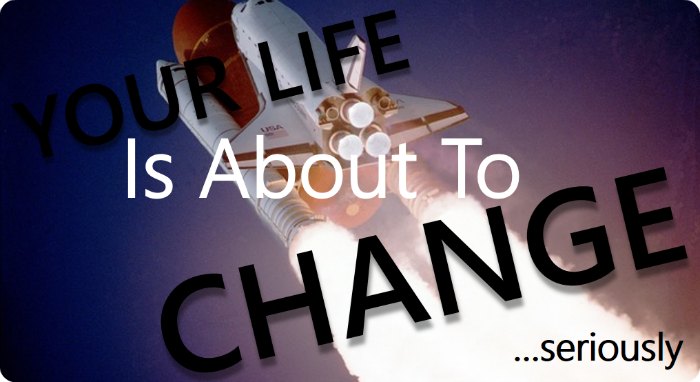
What is SelfHelpMentor.com?
Let me start by making an admittedly bold claim: This totally free self help website and blog is designed to change your life. Of course, you will be the ultimate judge of that. But if you are here today reading these very words, I can guess with some certainty that you want to change your life for the better, right? Great. Let’s not shrink away from that.
It’s okay to want a much better life for yourself and for those you love. It’s okay to want to have more success and greater experiences.
It’s okay to want to be great!
Whether you realize it or not right now, you have tremendous power to dramatically improve the quality of the rest of your life. But it will require you to learn more, to think differently, and to take greater action.
BUT YOU CAN DO IT!
Even if you are feeling defeated or less than powerful right now, I promise you, you can get there. And I can help show you the way.
Here’s one of the problems: Almost everyone and almost everything around you is acting like a giant gravitational pull toward mediocrity. They make you feel practically ashamed to dream huge or to have giant goals. They do little things, often subconsciously, to discourage your success because any triumph of yours would be a painful reminder of their own lack of ambition or failures.
This website is your oasis from that middle-of-the-pack thinking. This is a place where self improvement is championed, and where unabashed optimism about your future is perfectly acceptable. But it’s also a place where settling for a life you don’t want to settle for is not okay.
This is the kick in your pants you’ve been waiting for!
So let’s address a question that can shed more light on what Self Help Mentor is about.
What Is Self Help?
The term “self help” means different things to different people. But for me it’s pretty simple. Self help simply refers to any information, motivation, or strategy you can use to help yourself live a better life. So this website will cover many topics with just one basic threshold for inclusion. If I think something will improve your life, I will tell you about it. Period.
So why has “self help” gotten such a negative connotation in some circles?
It’s quite simple. Many, if not most, of the very popular self-help gurus these days sell snake oil. They spout ideas that sound great but simply don’t work. They try to teach you how the universe operates despite the fact that they have an encyclopedic ignorance of how it actually does. They talk about “laws of attraction” that are not actual laws. They talk about “secrets” that are really just scams. They talk about get rich quick schemes that will get you broke quick, weight loss plans that are doomed to fail, and a million other notions of nonsense.
I know that I have not yet had the opportunity to prove my expertise to you, but as we get to know each other better, I am confident that I can persuade you with logical arguments and demonstrable evidence that many of these self-help instructors are (for lack of a better term) full of it; that there are better, more effective self-help strategies to be learned.
You Can Change Your Life (but you have to get real)
You can be drenched in optimism without succumbing to magical thinking. There are constructive, reality-based ways to view the world that can still dazzle. You have powers to dramatically change your life that are real, yet still extraordinary.
But real means real. So you will never catch me uttering some personal development nonsense like, “If you can believe it, you can achieve it.” C’mon, you and I well know that there are a whole host of stupid things some people truly believe that they can never achieve. If you’ve ever seen some of the delusional, early-round auditioners for singing contests like The American Idol, you know what I mean. Plus there is this pesky scientific fact called genetics that will prevent a 4-foot man from ever becoming a star NBA center.
But despite these inconvenient truths, this website will explore in great detail the many stupendously encouraging facts of life such as how the vast majority of goals that most people dream about are well within their reach if they simply take action. Or how by working harder or smarter, you can usually overcome your lack of natural gifts (like if you think you’re not intelligent enough, good looking enough, you lack innate confidence, have too slow a metabolism, etc.) for most human endeavors, even many that you suspect are only within reach of the “naturally gifted.” Or how by learning to recognize and seize opportunities, you can greatly enhance your chances of tipping the scales of luck in your favor. Or how by simply mustering up some courage to try a new, better approach, you can often get the job done.
We’ll get to those lessons and many, many more soon enough, but before we start, I want you to know that every piece of information on this site is provided to you absolutely free. Of course, I may write books occasionally or create courses that I would hope that you would buy, or I may politely ask for a donation from time to time, but other than that, nothing on this website costs you a dime.
Enjoy it all to your heart’s content!
My Final Suggestion
One of the recurring themes of many of the lessons on this website will be how to best use your time. Although we don’t all get to have the same exact life spans, there is one great equalizer for every human being who has ever lived on earth or ever will.
We all get the same number of hours to spend each day, week, month, and year.
Yet if you are like every human being (including myself), you have squandered many of these hours in the past on activities that did not improve your life. They weren’t very productive, instructive, or maybe even all that enjoyable.
Why not take just a small fraction of the time you regularly spend on mediocre entertainment (your less-than-favorite TV shows, video games, movies), unnecessary shopping, overeating, trivial celebrity news, mindless web surfing, minutia on Facebook & Twitter, or the many other low or diminishing-return activities you regularly engage in, and instead, invest some of that time in learning how to create the life of your dreams.
Fill your mind with positive thoughts and constructive strategies that will make your next 1, 5, and 10 years blow away your previous years.
It’s not too late!
…And it’s never too early.
It’s time. Right now.
A better career, better relationships, more happiness, more passion, a more exciting life – these things do not usually come without some directed, concentrated effort on your part.
What if you made self improvement a regular habit? What if a better life for yourself wasn’t just a wishful, fleeting thought you had now and then, but a directed focus of your consistent effort and attention? What might your life look like 1, 5, and 10 years from now?
What if from today forward your life was a relentless charge toward your fullest potential?
Aren’t you at least a tad bit curious?
Would working regularly toward that goal with the help of some friendly guidance be beneficial? Someone who could give you a great tip, a little push, or maybe even a big shove on a regular basis.
Well here’s my final suggestion: Please make a habit of spending some time here every week. Your life is too precious to just hope that things will somehow fall into place soon. You need to be proactive. You need to learn more about it, so you can then do more about it.
Your great life change can begin today.
Please let me have the pleasure of being your Self Help Mentor.
P.S. – If you would like to get a head start on building your new life, join the others who have decided to get proactive about this by signing up for my free “Useletter.” This way you won’t miss out on any future life-enhancing lessons or any free bonus materials. Your email will never be shared and you can unsubscribe anytime. (Plus you get a great lesson on how to create habits right when you signup!)
Yes, I Want To Get Access To Every Lesson!
What Can You Expect To Learn Here?
Here is just a taste of some of the lessons you will be learning from me in our future time together. I really look forward to sharing these lessons with you:
- Fear is exceedingly commonplace in many endeavors, especially new ones. It is felt by almost everyone, at least some of the time. Often the best course of action is to figure out how to work through your fears, not to figure out how to eradicate them.
- Genetics (or your natural talents or lack thereof) are usually not nearly as strong of factors in your success as greater or smarter efforts are. Your dreams are probably within your reach, but they will require significant effort and dedication. In other words, you probably have what it takes. The real question is whether you are willing to do what it takes.
- Most of your life is spent on autopilot. It takes concentrated mental effort to break free of your daily action (or inaction) routines. But if you take the necessary steps, you can do so.
- All people, including you and I, are exceptionally bad predictors of what will make us happy. Thus, we must learn clever ways to better guide us toward happiness. Read this book if you think you already know best what will make you happy. (Honest Disclosure: This page contains affiliate links to Amazon.com)
- There are no magical forces controlling your life so stop wasting your time looking or waiting for them. YOU are the most powerful force directing your life (except in rare cases like slavery or false imprisonment). So start working on improving yourself, becoming more powerful, and getting the life that you want.
- Luck and coincidence (i.e. random chance events occurring or intersecting) are real, and by definition, outside of your control and impossible to predict. However, you can often navigate and manage around these occurrences of random chance, thus effectively and dramatically increasing the chances that good things will happen in your life.
- We are the centers of our universe. This fact distorts our perceptions of the world, creating mental illusions that trip up our thinking in the same way that optical illusions trick our eyes. For example, other people are probably far less preoccupied with you than you think. This has tremendous implications for how you assess criticism. This is but one example of how we must train ourselves to better understand the true nature of how we relate to the world and people around us.
- Money is usually better spent on experiences than things.
- Most people make financial mistakes that could be easily corrected with a very small amount of effort or sacrifice. Learning to correct these mistakes will have a tremendous positive impact on your life.
- Education and the scientific method are the greatest shortcuts to human progress the world has ever known. You are doing yourself a huge disservice if you don’t tap the wealth of knowledge resources you have available to you. Reading more books and asking evidence-based experts for more advice are probably two things you need to be doing more of.
- Taking action and often making mistakes is usually far more beneficial than not taking action and thus missing out on success possibilities. This is because the occasional successes that are struck by action-takers usually far outweigh the negative consequences from their action mistakes. Of course, there is a line between taking smart, calculated risks and being ignorant and reckless. You can learn to better assess this line.
- How to better calculate risks and probabilities is a skill that most people never learn. It has implications for career choices, doctor visits, whether you should buy insurance, get married, get divorced, and a million other things. A few basic mathematical concepts that can be easily understood by almost anyone (even those who think they hate math) will dramatically improve your decision-making in all areas of your life.
- Positive thinking is one of the most powerful, but also most misunderstood and incorrectly taught skills you can develop. Most self-help gurus don’t have the first clue as to how it really works and that is why it rightfully has such a bad connotation for many smart, skeptical people. But this is unfortunate because there truly are scientifically proven ways to improve your thinking that will not only make you happier (a winning outcome in itself) but also propel you to more positive, constructive action.
- You should care a lot less about what everyone else thinks of you and a lot more about what you think of yourself. (Unless you are already a narcissist, in which case, you should probably do the exact opposite.)
- Procrastination is your enemy. It is the thief that will steal away your every dream. You must learn how to defeat it or it will defeat you.
- You must stop measuring your self-worth by popular, societal norms. They are often misguided. You should measure yourself by what is really important in life. Measuring yourself by what is really important will guide you toward living a more substantial, beneficial, and rewarding life. And once you are living and valuing this sort of life, you will be (and feel!) successful.
- You must think of yourself as a work in progress and not as a finished product. Without further explanation, this probably sounds like a random, peculiar, and not-so-important concept to you. But once you understand this more fully, you will see that this concept has astounding implications for every area of your life. It might also be the greatest parent-to-child advice you can impart on your children. (Read this book if you’re curious.)
- You cannot always trust your “gut.” Understanding how your “intuitions” work will help you to better understand when you should and should not trust your “gut feelings.” This requires some knowledge of how the subliminal mind operates and how it can correctly and incorrectly interpret patterns.
- Because you are living on planet earth today and probably in a relatively free county, you have greater power to shape your own destiny than over 99% of humans who have ever lived. You are probably vastly underestimating your own potential.
- It is a mistake to think that most greatness comes from giant leaps of extraordinary execution or creative genius. In order to tap your vast potential and reach levels of success that you can hardly dream possible today, you will probably need to undertake a long, continuous series of incremental achievements and progress that you are very well capable of beginning today. And each step toward your greatness will likely be no more difficult than the one before it. This is because you will be accumulating more and more skills and power every step of the way.
- Taking your first steps toward a goal is half of the battle. Once you start moving, you will have the power of momentum on your side. It is very difficult to recognize your own power to achieve a specific goal or to spot all the possible paths to get there until you are caught up in the proactive mindset that will likely accompany this momentum.
- The vast majority of things you fear will never happen to you. And even the ones that do will often be less painful than you had imagined. You have evolved as a human to be extremely resilient. You are practically like The Terminator in many regards. Don’t underestimate your vast power to bounce back from almost anything that happens to you. And just knowing this fact can help make the world seem a lot less daunting.
- You are just as worthy of having a great life as any human who has ever lived or ever will. You must never think that those people who live “dream lives” are somehow very different from you. In most ways, they are not. And even if their specific version of a dream life is not within your reach, “a” version of a dream life is. You must never stop reaching for it because it is very likely within your grasp.
Those are just some tidbits to whet your appetite. There will be many more lessons covered here as well.
Again, if you haven’t already, please take a couple seconds to sign up for my free useletter so that you don’t miss out on any important lessons that could help you live the life you dream about. In fact, one of my favorite lessons: “10 Minutes To Create Habits That Stick,” is waiting exclusively for you as a new subscriber.
Yes, I Want To Create Positive Lasting Habits!

Who Is Mark Blade?
Mark Blade is someone who (like most bloggers on their “About” pages) loves to write about himself in the third person. But because he realizes it can come off as fake and obnoxious, he will stop now.
I was tempted to write about myself in typical, bullet-pointed website copy, strewn with factoids to try to impress you like this:
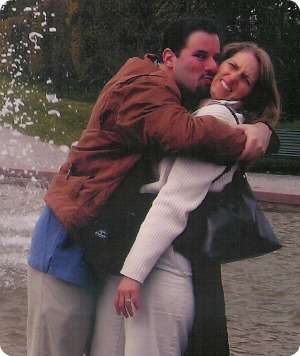
What can I say? She finds me irresistible!
- I am 46 years old and live in Los Angeles, California.
- I have an adoring wife (can’t you tell from the picture?) and some cute, 4-legged friends.
- I have had a very colorful, rewarding, and multifaceted career including:
- Successful Hollywood movie executive
- Successful dot-com entrepreneur
- Successful professional poker player
- Successful non-fiction book author
- Other successful entrepreneurial endeavors
- All of which have allowed me to never have a real job, boss, schedule, or alarm clock for roughly 20 years.
Academic/Intelligence Credentials include:
- Valedictorian of my high school.
- Sociology degree from a top ranked U.S. university. (UCLA)
- MBA from another top ranked U.S. university. (USC)
- Scored in the top 1% on the GMAT (which is harder to do than scoring in the top 1% on the SAT).
- Qualified for MENSA (which is easier to do than you might think).
I was also tempted to write the ever-so-popular, long list of quirky personal facts like:

Umm… Yummy!
Favorite Beatle: Paul
French Toast or Waffles?: Waffles!
I enjoy the “random facts about me” type stuff. It can help you to really connect to to your favorite blogger because it creates some nice, humanizing touchstones.
So there’s definitely a time and a place for it.
But if you really want to get to know me well and truly understand how my life experiences molded me into someone worth taking important life advice from, do you really care if I like waffles?
Similarly, bio/accomplishment facts can be somewhat lacking in insightfulness because they only give you a hint as to who I really am, what I know, and what I believe.
For example, although I have always had an entrepreneurial bent myself, I believe that success and happiness can come in many different shapes and sizes. You do not have to be your own boss or a big risk-taker to be happy.
And yes, I may have earned a couple of decent academic degrees from some good schools, but they don’t necessarily prove a thing. Some of the most clueless people sharing some of the worst information are Ivy League graduates. While some of the smartest people sharing some of the best information are high-school dropouts.
I don’t have a Ph.D. in psychology, yet I’ve acquired a considerable amount of beneficial information on that topic that I can share with you. Tony Robbins (Amazon bio/books link) didn’t even go to college, but if he gave you some good, practical, self-help advice that worked, I seriously doubt you would care.
Nor should you!
Therefore, I think the best way for you to get to know me and to understand where my rich insights on life come from is to dig a little deeper.
So here’s my life story in much greater detail. It’s on the long side (it’s basically a free ebook-sized autobiography/self-help book disguised as a web page), so as I’ve explained before, feel free to skip it if it doesn’t interest you. But if you do read it, you’ll probably enjoy a few laughs along the way, but most importantly, I will point out some nice universal life lessons intermittently that you can apply to your own life. My hope is that you will learn from both my successes and my mistakes. (Actually, I purposely go into much greater depth regarding my mistakes as I believe that you can often learn more valuable lessons from those.) So here goes:
Once upon a time…

I was born and raised in Los Angeles with two older sisters and one younger brother.
When I was 7, our family was rocked by the passing of my father from a sudden heart attack. He was only 42.
But fortunately, other than that, I have very few childhood complaints.
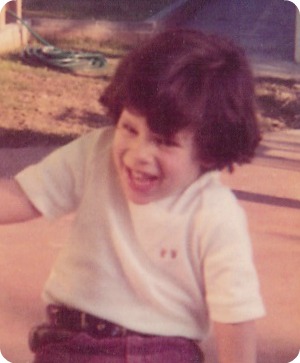 My mom devoted herself to us kids, and our family was always close.
My mom devoted herself to us kids, and our family was always close.
Money didn’t grow on trees, but other than brown bags every day for lunch and not having a car until my 20’s, I never felt deprived in any way.
Heck, while kids were starving in Africa, I earned enough money from my paper route to buy an Atari.
What was there to possibly complain about?
Plus, I had a group of close friends who all had great senses of humor.
SHAREABLE LIFE LESSON:
Make friends and laugh with them often. It will probably make you much happier.
The value of knowledge was fostered in our house, mostly by example. My mom would read the newspaper cover to cover every day and we were always making trips to the library to pick up more books to read. Being smart and informed were assets that I realized very early on could be key factors for success and possibly for discovering better routes to happiness.
I always made sure to get the job done with my schoolwork and to contribute to my sports teams, but my real favorite subjects in life were TV, movies, and music. As a teenager, I not only loved to watch and listen to them, I wanted to learn every single detail about them. Who made them? How were they made? How does the entertainment industry work? I would read trade magazines and showbiz biographies from the library, plus every word of the LA Times entertainment section like it was a sacred scroll.
I didn’t know it at the time, but this knowledge would come in handy during my early career.
I eventually graduated, and with my good grades, I might have had a shot at an Ivy League school, but I never applied. All my high-school buddies and the entertainment industry were in L.A.
 So to me the choice was obvious.
So to me the choice was obvious.
I would go to UCLA.
Applied and accepted.
Done.
My Summer Of Fearlessness And How My College Plans Took A Detour
The summer of 1987 was very memorable for me. Before I tell you what happened, I need to preface the story.
While my primary school years were generally quite satisfying by most measures, I always struggled with significant nervousness and shyness. I made male friends fairly easily and was always confident and carefree while hanging out with them. But when interacting with adults, talking to girls, or speaking in front of any sized group, even just a classroom of the same classmates I would see every day, I was often extremely nervous.
At a football banquet once, I was asked to give an impromptu speech about one of my coaches and I stammered so much that some people thought I was actually doing it as a joke. The fact that I have always been much quicker to perspire than the average person under any circumstances, but especially so in nervous situations, only compounded my problems.
During the back half of my senior year, I had to give a speech in one of my classes and I sweated and stammered my way through it so badly that I remember overhearing my teacher telling another adult afterwards, “How is he ever going to give his valedictorian speech at graduation?”
Leading up to graduation day, I was wringing my hands about that speech. I knew it was going to be an absolute disaster. I confided my fears to my friend, Bob, and he told me a cool fact he had picked up somewhere:
SHAREABLE LIFE LESSON:
Your subconscious mind cannot easily distinguish between reality and your imagination. So if you practice something enough and visualize it vividly enough, it is like half of your brain is getting comfortable with it and feels like it has already done it numerous times.
I took his advice to heart and became a practicing and visualizing machine.
By the time it came to give my speech, my subconscious mind had already given it a thousand times.
And you know what?
It worked!
Not completely. I was still pretty nervous, but I wasn’t sweating and stammering nervous. I was able to stay cool and to deliver all the lines like I wanted to. I got laughs in the right places and touched a few hearts with a nice note about my mom. Overall, it went about as well as I could have hoped for.
I was on cloud nine!
The weight of the world had been lifted off my shoulders and I started to feel like I could do anything.
Next Stop: MAZATLAN
I was friends with about a dozen guys who were as thick as thieves. We were actually spread out among five different local area high-schools, but through various connections had come together as a super tightknit pack.
We were very fortunate that with such a broad reaching network, parties were easy to come by. So Friday and Saturday nights from sophomore year on were always filled with laughs and adventures. It felt like we were living the lives of the movie characters from some R-rated teen comedy like American Pie or Superbad. (And honestly, the alcohol did provide some necessary courage to combat my shyness.)
The mother of one of my friends was an airline executive, and as a graduation present, she scored free plane tickets and hotel rooms for all of us for an entire week in Mazatlan, Mexico.
I had never been out of the country.
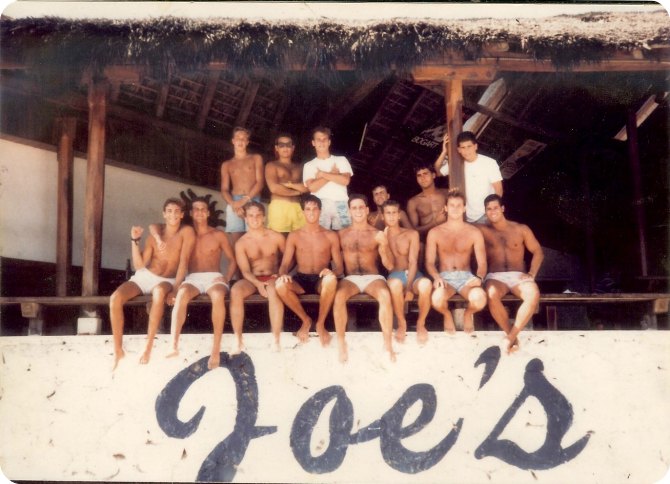
That’s yours truly, bottom right. My friend, Jim, who you’ll read about soon, is bottom row, 4th from left.
There is something magical about travelling as it can often give you a larger and more accurate perspective of the world. My hometown felt so far away. All my worries and fears that were intertwined with my life back home now seemed so small and trivial.
If my successful graduation speech had already punched fear in the gut, my newfound life perspective from the shores of Mazatlan was like a knock-down blow.
Being surrounded by my friends had always been a huge confidence booster in and of itself, but mix in the perfect timing of entering adulthood, questioning authority, feeling excited about my upcoming college life and its world of possibilities, and for me at least, is was a recipe for total fearlessness.
My entire worldview had been turned upside down.
A pack of pretty girls sitting at a restaurant table? I don’t need liquid courage. I’ll plop myself down right next to them sober and spark up a charming conversation.
An empty dance platform center-stage at a nightclub? Hop on top of it and dance like no one’s watching.
Upon returning home, I was ready to seize every opportunity that life presented to me.
It wouldn’t be long before one would come my way.
I was working that summer at a gas station that didn’t have many customers. This allowed me to spend a lot of time sitting on a stool and reading books from the library.
One of these books was “Beat The Dealer” by Edward O. Thorpe. This was the landmark 1962 book by the mathematician who discovered that you could win at blackjack by counting cards.
It blew my mind!
Card games and gambling had always fascinated me. My mom and her siblings took yearly Las Vegas vacations, and when she would return, I would pepper her with questions about the games she played, and she would teach me the rules.
I also played fairly complex card games every holiday with my grandma and other relatives starting at the age of 5. Around 12, I began to play for pennies in poker games that my mom, aunts, and uncles would play after most holiday dinners.
So you could imagine how this blackjack book was right up my alley.
If you were raised in the internet information age, you need to realize that 1987 was the relative equivalent of the dark ages. If you wanted to know something, you had to ask someone who had that information in their head or you had to find the info in a book or an encyclopedia which was about 1/100th the size of Wikipedia. Plus, I was 18 years old and still relatively ignorant about the ways of the world.
So I was convinced that I had stumbled upon the secret Holy Grail of making money.
To be sure, I double-checked with my mom:
“Blackjack is still super popular and offered in like every casino in the world, right?”
“Yes, dear.”
“Okay, thanks mom.”
Holy crap!
Blackjack still exits.
I just discovered a book that actually teaches you step-by-step how to win money at blackjack.
Therefore…
…WHY THE HECK AM I GOING TO COLLEGE??!!
Phone call number one was to my buddy, Jim.
He was a year older than me and worked full-time at his family’s business. But he disliked his job, so he was always on the lookout for something better.
“Dude, I just found our big thing.”
The plan was hatched.
He would quit his job.
I would cancel my college plans.
We were going to become professional card counters!
Now remember, as crazy as my weekend party life was with my friends, I was still “Mr. Straight A’s, head-screwed-on-straight, every mom would be happy to date their daughter” guy. I couldn’t just announce to the world that I was dropping out of college to become a card counter. Also, none of the popular movies or books about MIT card counters had even come out at this time. Rainman hadn’t even been made.
The idea of me announcing this plan to the world would be like announcing that I was moving to Jamaica to sell weed for a living.
So my friend and I started coming up with all sorts of convoluted stories. I can barely even remember the details as I think they changed every time we told them, but they mostly centered around supposedly moving to New York to look for investors for something or another.
 My mom thought I was on drugs. Literally!
My mom thought I was on drugs. Literally!
After convincing her that I wasn’t, she still made me sit down with one of my uncles, who was a Catholic priest, to see what he thought of whatever I was up to.
I don’t know what I said, but I remember being very passionate and convincing.
Afterwards, he told my mom, “Just let the kid do his thing and if it doesn’t work out, he can start college next year.” Thanks, Uncle Louie!
The reason we picked New York for our cover story was because of its proximity to Atlantic City, the only other major U.S. city where casino gambling was legal at the time. I knew we couldn’t become card counters in Las Vegas because my mom might spot us on one of her vacations.
In my head, I had done some calculations and figured out that we would play blackjack for about 5 years straight, become rich, and then retire. (I’m not sure which quadrant of my butt I pulled that number out from.)
I know that this is going to sound very strange in the era of cell phones, emails, and texts, but we hopped on a plane to New York without any promises to our family or friends that we would be keeping in touch. Obviously, pay phones existed back then so I don’t know why it went down like this, but it was like we were a couple of Christopher Columbus-es setting sail to the New World.
“We’ll see you when we see you.” And we were off!
We probably each had about $3000 in traveler’s checks from all of our personal savings.
We landed in New York and immediately hopped on a bus for Atlantic City. We checked into a flea-bag motel in the evening and went to sleep.
Our plan was that we would spend our first week in the motel honing our card-counting skills before we hit the casino with our small bankroll. We weren’t 21 (the legal age for U.S. gambling), but had learned from older friends and relatives that casinos didn’t check for ID if you looked like you were in the ballpark, which we did.
That first morning I was ready to start our practicing, but Jim was eager to check out the casino, just to get a look at it. So off he went by himself.
He returned an hour later with shocking, life-changing news:
“They don’t deal blackjack from a single deck!”
“Whaaaatttt??!!”
http://www.youtube.com/watch?v=VcE5wjCrQ1c?rel=0
“They have a giant stack of like eight decks all shuffled together that they deal out of this rectangular box thing.”
Oh.
My.
God.
It seems that between the publication of that book and 1987, the casinos had discovered a few tricks to thwart potential card counters:
- Multiple decks.
- Barely dealing deep into a single deck if you could even find a casino doing so.
- Banning any players who vary their betting amount sizes in concert with the pattern of cards that have been dealt (which is the key to profitable card-counting).
If we had been ingenious enough, we could have possibly figured out some successful team strategies like the famed MIT card counters (Amazon book link) did, but I don’t recall us even doing any Plan B brainstorming.
I simply remember knowing instantly that very moment that all of our plans were dead on arrival.
What the heck were we going to do now?
Jim wasn’t in any rush to return to the family job that he disliked. I was too embarrassed to scurry home one day after we had left.
Weren’t we supposed to be in New York looking for investors or something?
So we thought, ‘Hey, we’ve got some travelers checks burning holes in our pockets. Let’s go to New York for real!’
So for about a month, we rented a flea-bag apartment near Harlem and just hung out. We bought subway passes and did any touristy thing we could think of that didn’t cost much money.
 I remember both of us just happened to be sitting on some building ledge near the New York Stock Exchange on October 19th. All these people in suits were frantically pacing around with panicked looks on their faces and talking about the stock market crashing. It was Wall Street’s legendary “Black Monday.”
I remember both of us just happened to be sitting on some building ledge near the New York Stock Exchange on October 19th. All these people in suits were frantically pacing around with panicked looks on their faces and talking about the stock market crashing. It was Wall Street’s legendary “Black Monday.”
To us, it was just another day of doing nothing.
We watched them as we ate hot dogs.
The weather got cold and with half our money left, we flew to Las Vegas and spent another month in a flea-bag motel near downtown. We ate cheap buffets every day and watched a lot of TV, and when the money ran out, we returned home with our tails between our legs.
We brushed off any questions about what happened with a joke or with the teenage standard, “I don’t wanna talk about it.”
After a while, people stopped asking. Our families and friends were basically just happy to see us again. They mostly treated us like proverbial prodigal sons.
My friend returned to his family job. I returned to my job at the gas station, but luckily, I had deferred my UCLA acceptance just in case.
So finally, one year later than originally planned, I entered college.
SHAREABLE LIFE LESSON:
You can fail spectacularly in life. You can worry endlessly about the embarrassment of it all. When all the while, the most likely outcome is that your friends and family won’t treat you any differently and your life will be exactly the same as it was before.
By the way, when my family and friends read this, it will actually be the very first time they will learn the real truth about my “New York” escapades.
I can’t imagine that this rises to the cathartic level of somebody coming out of the closet or anything, especially because it’s so trivial and happened so long ago that I’m not all that embarrassed by it. But still, I have to say that it feels pretty good to get it off my chest.
SHAREABLE LIFE LESSON:
If you are holding onto a secret that is weighing on you, (and without a doubt if it’s one as silly as this one,) set it free.
My College Years: Stand-up comedy, poker, Paramount Pictures, and Beverly Hills 90210
As I started college, my only real concerns were my foggy career goals. I was still interested in the entertainment industry; I just wasn’t sure if I could actually get a paying job within it.
Showbiz career paths aren’t neatly carved out like those for becoming a doctor, lawyer, or accountant.
My two dream jobs were to become a stand-up comedian or a screenwriter. Dropping out of school crossed my mind again as I knew that neither of these jobs really required a diploma, but I also figured I might need one as a back-up plan at some point, especially since I had just learned the hard-way that things don’t always go as planned.
I considered applying to UCLA’s esteemed film school, but that seemed more suited for aspiring directors. I could take intro screenwriting classes without that major, and I could crash graduate level producer classes taught by the likes of movie mogul, Peter Guber (Amazon book link), and attend numerous free lectures and movie screenings with Q&A’s by visiting Hollywood titans.
I could practically craft my own film school just off of all the extracurricular activities on campus.
The opportunities to soak up free stand-up comedy at UCLA were also plentiful. HBO and other TV specials were often filmed there. Also, many of the young up-and-coming comedians lived in L.A. and would constantly perform on campus. David Spade did free shows in my dorm lounge. The following year I knew his career was advancing because he moved up to the pizza hall in the center of campus. The year after that he was on Saturday Night Live. That sort of comedic talent streamed through campus all the time.
So as far as my official classes went, all I wanted was to find a major that would require the absolute least amount of time and effort so I could devote all my free time to college life and my entertainment industry side education.
I discovered my answer by asking a question: “Hey, what major are the scholarship football and basketball players being steered toward?”
Answer: Sociology.
Bingo! I’m a sociology major! I don’t even know if I really knew what it was.
So I started taking lots of sociology and psychology classes, and I was pleasantly surprised to discover that not only were the classes relatively easy to pass like I had hoped, they were pretty darn interesting.
Imagine going to a top university where Malcolm Gladwell (Amazon bio/books link) wrote all your textbooks. That’s basically what my classes were like.
A lot of what I was learning was also overlapping with a serious interest I had acquired in reading self-help books. It had started in my latter high-school years, but had kicked in even more strongly in college where I had access to any book I ever wanted to get my hands on through UCLA’s incredible libraries.
Second Major Failure: My Entire Stand-Up Career Opens And Closes In One Night
I spent some of my considerable free time writing jokes for my wannabe stand-up career. The jokes were surely awful, but even worse, I didn’t have any privacy to practice delivering them. I lived in a tiny, 3-person dorm room with paper thin walls. I’m sure if I had tried harder, I could have found some empty spot on campus to practice, but for whatever reason, I didn’t.
I simply decided to take the plunge one night at an open mic night at one of L.A.’s legendary comedy clubs.
I went all by myself, and around 1:30am, I took the stage to a dwindling crowd.
I was instantly blinded by the bright stage lights.
Mentally off-balance, I nervously uttered my opening lines and they landed with a thud.
I froze in fear, then feebly tried to get anything resembling my jokes to escape from my mouth.
Within about 30 seconds, the room manager was frantically shining a flashlight at me which I had been previously instructed was the emergency notice to get your butt off of the stage.
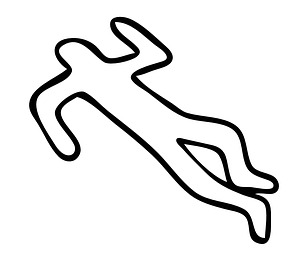 Dejected, I returned to campus with all my stand-up dreams murdered and surrounded by yellow crime tape back at the club.
Dejected, I returned to campus with all my stand-up dreams murdered and surrounded by yellow crime tape back at the club.
I was obviously not a stand-up comic endowed at birth with effortless, natural talent and ease on stage. By the way, most successful stand-up comics are not either.
But in my mind at the time, that meant I would never be able to become one. Thus, the dream was officially over.
If I knew then what I know now, I would have realized that one’s true potential is often unknowable.
Sure, some things are easier to predict such as if an 18-year old has worked hard on his track team all through high-school, yet is still a slow runner, it is highly unlikely that elite training will turn him into an Olympic 100 meter gold medalist. Or if a 25-year old has tried to sing for years and still cannot come close to hitting an ear-pleasing note, it is highly unlikely that she is one great singing teacher away from becoming the next Whitney Houston.
But the genetics involved in sprinter muscles or vocal cord design are more the exceptions than the rule.
Most of the skills you desire are probably within your reach. And going from bad public speaker to great public speaker, or from bad joke writer to great joke writer is not only quite possible, such transformations are extremely common among numerous successful comics who have had disastrous beginnings. In fact, many bomb on a nightly basis for years before they develop their winning skills.
SHAREABLE LIFE LESSON:
The myth of “the natural” is mostly bogus. Most worthwhile skills take a long time to develop and early results don’t usually reveal your true potential. Don’t be so quick to give up on your dreams.
To offset my college costs, I worked part-time as a dorm ID checker, pizza delivery guy, and movie and TV extra. Being an extra was great because 95% of the time you would just sit around. While the other extras were bored to tears or foolishly awaiting some fairy tale moment when they would be plucked from the sidelines and given a starring role, I would use the time to complete all my college homework. (If you don’t blink, you can find me walking down hallways or dancing at parties on reruns of old shows like Beverly Hills 90210.)
It was around my junior year that I discovered another way to make money.
My First Foray Into Professional Poker
My friends from high-school were planning a trip to Vegas. It would be my first time there since my hide-out during that year after high-school.
I knew that I didn’t want to gamble on any games where the house (i.e. the casino) had the mathematical edge (craps, roulette, slots, etc.), and I already had a bad taste in my mouth from Blackjack.
 So I decided to look into poker.
So I decided to look into poker.
I knew that because poker was a game where players played against each other and the house simply took a fee to deal the game, it was theoretically beatable. So I checked out a poker book from the library and studied up.
The only gambling money I really had to lose was $70 that my aunt gave me before the trip. Thanks, Auntie Josie!
When we got to Vegas, I observed a poker game nervously from the rails. I finally mustered up some courage and made my approach.
It was very intimidating to sit down at a table of experienced older players, but even more than that, it was fun! I quickly learned the table etiquette, and before I knew it, I was pulling an all-nighter, playing for over 12 hours straight before my $70 finally ran out.
I was bitten.
I knew that I made some rookie mistakes, but I also knew that with some more practice, I could fix them.
I had recently gotten my first car (a used Honda civic) so on a subsequent weekend, I drove 4-plus hours to Vegas all by myself. I slept in my car in the Excalibur Casino parking lot and used an unreturned room key from my previous trip to enter the pool area and use their showers for free. I played all weekend long and returned home with a couple extra hundred dollars in my pocket.
My pizza delivery and extra-ing days were over.
My new part-time job: Professional Poker Player.
I would make weekend trips every two or three weeks and the $200-$400 weekend hauls were extremely consistent. Without getting too thick in the technical weeds, the ante structure of the way that Las Vegas dealt the low-limit version of the most popular game at the time (7-card stud) enabled a skilled player like myself to dramatically minimize the fluctuations that professional poker players often encounter today. So I honestly cannot remember ever having a losing weekend trip during those college years.
But I never considered poker as anything more than a really fun, part-time job.
My main eye was still on Hollywood, so as I was nearing my senior year, I sought out an industry internship.
I landed one with a Hollywood mogul by the name of David Kirkpatrick.
He was one of the most powerful players in Hollywood. He had just come off of being the studio head at Paramount Pictures, and before that he was the studio head of both Walt Disney and Touchstone Pictures simultaneously. The most recent list of the 100 most powerful people in Hollywood at that time (including every actor, director, producer, etc.) had him listed at #50.
 He had now been given a mega-production deal at Paramount.
He had now been given a mega-production deal at Paramount.
This was the big time.
I started at the absolute bottom and worked for free.
But I had a winning attitude and was willing to work as hard as I could at anything they dropped on my plate. It was mostly “fetch this, fetch that, and file these” and I was happy to do it and I let everyone know that I was more than happy to do it.
SHAREABLE LIFE LESSON:
Let me give you the most powerful career advice I can possibly give you in one paragraph. It is nearly impossible for an employer to not like (and want to reward) an employee who is extremely friendly, willing to work extremely hard, curious (but knows their current place), knowledgeable (but still always willing to learn more), and who listens. The person who gets to work first, leaves last, and never treats a given task like it is beneath them will always greatly increase their chances of being promoted first and fired last. Period.
So after graduating, I was offered a full-time, paying job as Kirkpatrick’s second assistant.
My industry knowledge, which I had been ravenously accumulating since high-school, really came in handy. For one thing, I knew the names and resumes of just about every important writer, director, actor, and studio executive that my boss might need to interact with, and could deliver that information on-the-spot whenever he needed it. I also believe I had pretty good movie taste and could offer helpful creative input when needed.
Rather quickly, I began to move up the totem pole.
After a few years, I became his second-in-command.
I was only around 25 years-old, but I had my own office with a window, a secretary, and an expense account.
I was still living with my college roommates in an apartment but regularly experiencing things like getting picked up by limos to take first class plane trips to New York to spend entire weekends holed up in a hotel room with just my boss, a screenwriter, and Howard Stern while we all brainstormed ideas for his movie, Private Parts.
It was all very exciting.
But working face-to-face with top Hollywood screenwriters on a regular basis only made me want to become one even more. Any free time I had was spent doing one of two things: writing screenplays or playing poker.
Previously, toward the end of college, I had learned some surprising information. While I had been making those nearly 300-mile drives to Vegas on a regular basis, there had been bustling poker rooms in the L.A. area the whole time.
Again, remember that this was all before the days of the internet, so information was very hard to come by. At that time, it was commonly held knowledge that in the U.S. there were only two places where casino gambling was legal: Las Vegas and Atlantic City. The only commonly-known exceptions were bingo parlors and horse tracks. (Indian gaming had not taken off yet.) But unbeknownst to me, there was a quirk in the law that had also allowed a few inner cities in the L.A. area to operate poker rooms.
I had actually driven by these places on the freeway before, but never understood what they were. I thought they were pretend casinos like you might find at a charity party, or perhaps something like giant bridge clubs. Once I finally discovered that these poker rooms exited, I could make a short drive to play anytime I wanted.
And just like in Vegas, I continued to enjoy positive results.
But screenwriting was still my main dream.
During late nights and weekends, I managed to write a half dozen or so scripts. I would show one to an agent, and if they weren’t interested, I would immediately scrap it and write the next one.
This wasn’t a bad strategy, as it’s good for a beginning writer to get a large amount of volume under their belt as it’s the best way to improve your writing skills. But on the other hand, I was probably a little too quick to abandon the attempted sale of each of my works.
I just hated the prospect of rejection.
I had shown one of my earliest screenplays (which I had co-written with a friend) to my boss. It wasn’t a particularly commercial subject matter, but he really admired our writing, and although he didn’t want to produce it himself, he tried to pull some strings to get us a top agent, but to no avail. After that, I stopped showing him my subsequent screenplays as it felt rather awkward.
But I knew that my screenwriting skills were getting better and better.
Finally, I decided that the current career path I was on was only ideal if my objective was to become a successful producer or studio executive. In fact, aspiring movie producers would have probably killed to have been in my shoes with my career trajectory at that time. But I wanted to become a screenwriter and I thought that I needed to devote more time to that to really give it a fighting chance.
 So one day, out of the blue, I just quit!
So one day, out of the blue, I just quit!
It didn’t feel too risky though because I always had an ace in my back pocket. I knew that while I was writing, I could augment the money I had saved up with more poker playing.
So I did. And by devoting more time to poker, my poker skills started to really shoot through the roof. In fact, it wasn’t long before I began to earn more money playing poker than I had been earning at my full-time job.
This was great, except for one important thing. The poker playing was so distracting that I wasn’t writing much. In fact, I was probably writing even less than when I had a full-time job. But eventually I produced what I thought was definitely my most promising screenplay yet.
It was a big action, summer blockbuster type movie. And with that screenplay, I finally landed an agent.
But not just any agent, I landed one of the biggest agents in Hollywood at one of the hottest, most powerful agencies.
This was it!
I was at the threshold of screenwriting glory.
I could practically taste it.
A six, possibly seven-figure offer was just around the corner.
The screenplay was sent out to every major studio and top action-movie producer in town.
I was about to become an A-list screenwriter overnight.
Let the bidding war begin!
And then… And then…
…And then nothing.
No buyers.
Some nice feedback here and there, but nothing more.
My agent called me and said that he was pretty sure he could get me a staff position writing for NYPD Blue.
This was television nirvana. An Emmy-award winning show that could surely help me to cultivate an awesome screenwriting career.
But I had already been on the other end of the business, giving notes to A-list movie screenwriters about what they should change about their screenplays. Now, I would be on the receiving end, but even worse, I knew that in the world of television, there were even more people dissecting and chopping up your work, and as a staff writer, you might not even be in charge of your first draft. The show-runner would often tell you what to write, how to write it, and then change 90% of what you wrote.
And even worse than that, my schedule would no longer be my own. I had gotten very spoiled by the fact that I could determine my own hours. I could sleep in as long as I wanted every day.

Many hours spent on this deck, sometimes writing screenplays on my laptop. See why I didn’t jump at an office-based job?
I was living in a tranquil apartment complex located right along the water in Marina Del Rey, so I could lay on a shady lounge chair in my shorts all afternoon and watch boats and ducks glide by. I didn’t want to have to put on pants and drive to some office every day again.
Regardless of all these reluctant feelings about a potential staff writing job, if I had needed the work, I would have jumped at the potential opportunity in a heartbeat.
But remember, I had that ace in my back pocket.
So what did I do? I declined the suggestion and I went back to playing poker.
Even if I didn’t want to take a TV staff writing position, I should have continued to write screenplays as I was really, really close to breaking through. On my writing trajectory, it was likely that one of my next screenplays really would have sold, which brings us to another great universal life lesson.
There are two most common times when people quit pursuing a dream. One is when they fail right out of the gate. An example of this is my wannabe stand-up career. I got up on stage once, failed miserably, and I quit. One and done.
You write a novel and the first round of publishers you send it to don’t bite. So you quit. You write a blog for a month and the traffic doesn’t roll in. You quit.
The reason you quit is that you probably had very unrealistic success expectations in the first place. You thought that success was going to come quickly and without much effort. When these expectations are dashed, you wrongly conclude that you must not have what it takes. Or you correctly conclude that this is going to require much more time and effort than you had expected, but you are unwilling, for whatever reason, to put in that necessary hard work. (A common reason is that some other shortcut-to-success mirage catches your eye.)
The second common timeframe that someone quits pursuing a dream is when they hit what I will call the “so close it hurts wall.”
Unlike the first type of quitter, perhaps you correctly realize from the outset that your dream will require considerable time and effort. Or you learn this the hard way after your first failed attempt, but instead of quitting, you decide to hunker down and persist in your efforts.
Eventually you get really good at whatever you are pursuing. In fact, you get yourself right up to the threshold of success. You understand the game rather well now and you assess, quite accurately, that you are very close to breaking through.
So you allow yourself to get your hopes up for realistic, justifiable reasons. But despite these decent odds, you experience a failure. (Boy, life is cruel sometimes. Success can be a real tease.)
So it is at this second crucial point that people often quit. But this quit point is the most tragic of all because you truly were very close. One of your next attempts would have likely broken through. But the pain of getting so very, very close, and yet still failing, is too much to bear.
An emotionally detached observer would so clearly see the correct course of action in such a case: “Oh my god, don’t quit now. You are getting so close!”
SHAREABLE LIFE LESSON:
If quitting the pursuit of a major life dream too early is a bad mistake, quitting late when you are getting extremely close to a success breakthrough is the worst mistake. The most painful failures frequently occur when you are nearest to succeeding. So fight through that pain because the payoff for all your hard work and struggle is often right around the corner.
(By the way, there are certainly also times when quitting or altering your course are wise decisions to make. But I’ll save those lessons for another day.)
A Sad Event & A Happy Event
Around this time, something very sad happened. Remember my great friend, Jim, who accompanied me on our botched card-counting adventures together. As I spent more time with my college life and Hollywood career pursuits, Jim and I hung out less often. I would still see him, but only occasionally.
During that time, he started to get himself seriously involved with drugs, and then, as so often can happen…
…he died from a drug overdose.
I saw an interview with Leonardo DiCaprio once where he was asked for the most important advice he would give to any young up-and-coming actor. His reply: Don’t get involved with drugs.
He was almost apologetic in giving his answer because he thought it was such a clichéd thing to say, but he honestly thought that drugs were the biggest hindrance (or at least most avoidable pitfall) to a successful career.
When you think about it, actors such as Heath Ledger could have easily been as successful as DiCaprio, and perhaps even more so, if it wasn’t for their one major mistake in life.
Everyone thinks they can handle their favorite drugs right up until they discover that they can’t.
SHAREABLE LIFE LESSON:
Steer clear of anything more than moderate amounts of alcohol or marijuana (or perhaps certain psychedelics if you are extremely well educated about them). But if you have an addictive personality or genes, steer clear of absolutely everything. Drugs can rob you of all of your dreams… and maybe more.
Fortunately, during this time, something also happened which was very, very happy.
I began dating my future wife and we fell in love.
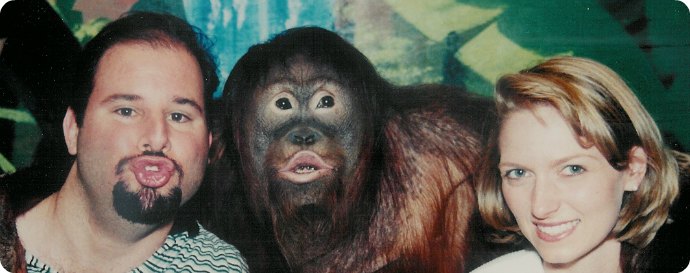
My wife and I during the weekend I proposed (plus some pretty blond woman I’ve never met)
I started to think more about my future and felt the need to come up with a back-up plan. This was still years before playing poker as a profession became slightly more mainstreamed and embraced by society. Even if you could make good money playing poker, it didn’t seem like a serious vocation in any way.
So half as a back-up plan, and probably half to impress my future wife, I decided to look into getting an MBA. Some of the top studio executives in Hollywood were starting to possess MBA degrees, so this was also not a bad move if I ever wanted to veer back toward the showbiz corporate suites. However, because I had barely cared about grades in college, my transcript was not stellar. I worried that this might preclude me from acceptance into a good school.
So I studied very hard for the GMAT (which is like the SAT for getting into MBA programs) and I was fortunate to score in the top 1%.

Yikes! I’m an alumnus of two bitter cross-town rivals. Who do I root for?
With that, I got accepted into the highly rated and competitive graduate program at USC.
I studied hard there too, but my heart was only half into it.
Most of the people in MBA programs are headed toward becoming traveling robot management consultants or brand managers at some behemoth corporation like Proctor & Gamble, devoting their entire lives to figuring out how to lure 3% more people into buying Tide detergent.
I remember once a Scandinavian student spoke up during a lecture in a room full of 150 students and said something like, “Why should we even care about selling more toothbrushes?” Everyone laughed. I thought it was one of the more insightful questions I had heard there in a long time.
On the other hand, I must admit that I learned a lot of valuable information. I learned to think much more clearly about what makes a business succeed or fail, and I picked up a valuable hard skill or two. But most importantly, it simply opened my eyes up more to how the world works.
One major eye-opener is that you realize that most titans of industry aren’t all that special. They are just regular people with an occasional good idea who simply work relentlessly to execute it.
Anyone from just about any walk of life (regardless of whether or not you have a formal business education or any industry connections to begin with) is much more powerful and capable of succeeding in the business world than you might think.
Business processes, and how certain industries operate, and how all their component parts interact isn’t all that mysterious. If you dig around for information, spend some time studying, ask people for help occasionally when you get confused, and then simply dive in and get your hands dirty, you can probably figure out how to run just about any business you have your heart set on.
When I first entered MBA School, I only knew basic word processing.
Many people were already on the internet, but I wasn’t.
Most of my fellow students were already fluent in Excel and PowerPoint, but I wasn’t.
I had never even seen a spreadsheet!
So what did I do? I bought a book on how to operate all the Microsoft Office programs, and after much trial and error (plus asking my fellow classmates for help with my many stumbles), I figured out how to use them.
By my second year, I had not only learned those software programs, I had also learned how to build a website.
I then used that knowledge to build a website-based company.
Shortly after graduation, I sold that web-based business to a publicly traded company for over $1.5 million dollars.
Unfortunately, they paid me in restricted stock which meant that I had to hold onto it for a year. By the time I was able to sell my stock, the company had squandered everything I had built and driven the rest of their company mostly into the ground.
I was only able to cash out about a quarter of a million dollars, which was still… awesome! (But awesome… minus a million or so extra bucks I thought I had there for a second. First world problems!)
Still, it enabled me to put off getting a full-time job.
I went back to (yes, you guessed it!) playing poker. But I also built a couple new website businesses.
These were great businesses that had very bright futures. Unfortunately, the dot-com market then crashed. Numerous internet companies, which owed me money for all the internet traffic that I had driven to them, declared bankruptcy.
Companies that had been considered juggernauts like eToys stiffed me for $5000 here and another $5000 there. Even that cute little sock puppet from Pets.com stiffed me!
It left me with such a bad taste in my mouth that I decided to scrap all my internet businesses and stick with where the safe money was coming from: playing poker.
In hindsight, and of course, all hindsight is 20/20, if I had stuck with those internet businesses and just kept chugging along through the rough patch, I could have very likely been an internet tycoon right now. People who started much later than I, doing the exact same things that I had been doing, are earning a bloody fortune today.
Such is life.
People often fret that they get into a lucrative market too late. I’m living proof that there is also such a thing as getting in too early.
However, these missed opportunities never really fazed me because my free time allowed me to improve myself in other, arguably more important ways.
I kept playing poker to pay the bills, but I only needed to play three days a week at most. And even when I played, I would bring books and magazines to read while at the table. (When you become very skilled at poker, you can play quite profitably, although not to your maximum profit potential, with less than your full attention on the game.)
I kept educating myself on various subjects, but self-help topics were always near the top of the list.
I Become A Book Author
About 10 years ago, I decided to write a book about poker: “Professional Poker: The Essential Guide To Playing For A Living.”
I worked extremely hard on it and I was thrilled with its reception in the poker world. An author of numerous, successful poker books himself called it “the best book on the subject of poker ever written,” and the author of “Poker For Dummies” called it the “the best poker career guide ever written.”
Foolishly, and to my own detriment, I barely did any promotion of it whatsoever. Fortunately, based primarily on positive word of mouth alone, it sold incredibly well regardless.
I would just sit back and receive nice royalty checks every month for years.
The advice in it is basically timeless so it still sells to this day, although not nearly as much as it did for the first five years or so. Still, it provided me with hundreds of thousands of dollars in subsequent income, which was great as it freed up even more of my time.
Writing that book is a great example of the simple, but profound power of taking action.
I could have easily thought to myself, “I could write a book about that,” and then never done anything about it. But instead, I committed to figuring out how to do it.
I didn’t know anyone who had written a book before. I didn’t know anyone in the book publishing business. I started completely from scratch. I simply bought a couple of books on the subject from Amazon and I was on my way.
By simply taking one incremental step forward after another, I took something that had begun as nothing but a thought in my head and turned it into a book that I could walk into my local Barnes & Noble store and see resting there on a shelf.
Just about every field of knowledge seems incredibly complicated and difficult to learn when you are on the outside looking in.
But when you dig a little deeper (which often just means reading a book or two on the subject), you will usually discover that things are not nearly as complicated as you had first imagined. Sure, they might require some prolonged and continuous effort, but they are usually all things that you are infinitely capable of doing if you simply commit to taking one forward step after another.
When I set out to build this website, I discovered that my website building skills from the late 90’s were completely outdated and useless. I basically had to start from square one.
So I did some Googling. Then I read a book, WordPress: The Missing Manual. Then I bought a domain name at GoDaddy (although I’d now recommend the cheaper and better alternative: NameCheap). Then I purchased a design theme called Divi from Elegant Themes. And then I signed up for web hosting at a company named HostGator.
In total, I spent around 100 bucks or so to get started and now here you are on my website reading this page I created.
Again, it really wasn’t all that complicated. It just required taking small incremental actions repeatedly over time, which in this case meant: Read, take a step, read, take a step, read, and take a step.
That’s all! And that’s the same required path to the successful completion of roughly 99.9% of all worthwhile goals in life.
SHAREABLE LIFE LESSON:
For any goal you have in life, if you simply commit to learning and doing it, you will probably get it done. Please don’t ever get tricked into thinking that your dream goals are any more complicated than that.
The publishing of my poker book also marked the start of a period of much deeper introspection.
I had always looked at poker as a simple means to an end. Put in some hours at the poker table and earn some money to pay the bills, take some nice vacations, and tuck some money away for retirement. It was never anything more than that.
I never aspired to become the greatest player in the world or to play in televised tournaments. That required far too much time and travel. I just wanted to make an easy buck, put in as little time as possible at the table, and think about what I wanted to do next with my life. It just so happens that when you string enough of these years together, you look back and realize that you have spent a significant portion of your adult life as a pro poker player.
Philosophically, I am a “live and let live” type of person. As long as what you do doesn’t hurt others or step on their rights, I strongly believe that you should seek out all the best information available to you and then decide for yourself what you want to do with your life.
So for those people who were curious to learn about playing poker for a living, I was (and still am) happy to inform them on how that works via my book. But I also don’t think that playing poker for a living is the highest or most noble life endeavor. In fact, I explicitly state as much in my book.
I was thrilled when I would read reviews like the official review of my book that appeared in CardPlayer Magazine (poker’s premier magazine) which accurately noted that it was just as likely to scare you away from a poker career as it was to entice you into one. That’s exactly what I was shooting for!
But regardless, I would regularly receive emails from people who looked at poker like it was the end all and be all of life itself. Emails such as from a 15 year-old kid in Germany who adored my book and couldn’t wait to finish high-school and devote his life to poker.

If only there were more interested fans so ESPN could televise a “World Series Of Science” competition. I’d watch that!
I would always tell these younger people that if they had any scientific aptitude whatsoever; if they had any outside chance of discovering the cure for cancer, that they should definitely pursue a higher education and focus on keeping those career options open too.
The world needs another scientist much more than it needs another poker player!
Observing them contemplate a life devoted to poker prompted me to ask the same questions about my own life. Barry Greenstein, a world-class poker player, released a popular poker book around the same time as mine. In it, he mentioned that if he was still playing as much poker ten years from that time, he would be making a big mistake with his life. That sort of notion struck a chord with me.
Also around this time, my mother in-law passed away at the age of 53. She had battled ovarian cancer for about a decade and had moved into our house for the final 5 years of her life.
It wasn’t at all like living with some annoying mother-in-law from a sitcom. She was nothing but friendly and fun to hang around with. I grew up in a house with mostly women, and during much of my 20’s, I had at least one female roommate, so it felt more like having a great friend/cool roommate who liked all the same TV shows and movies as I did.
Because we were so close, her passing was not only obviously very sad, but it was also a stark reminder to me of the preciousness of life. My father passing at 42 was also another obvious fact that I’d never forgotten.
So I decided to scale back my poker playing and work some more on various writing projects I had in mind, of many different varieties.
I had a couple poker book sequels that were close to completion, but for whatever reason, poker just seemed so trivial and unimportant in the grand scheme of things that I couldn’t fire up to finish them.
[A Side Note To My Poker Book Enthusiasts: For those of you who liked my book and have been patiently awaiting the sequels that I had previously mentioned were in the offing, first, I want to express my sincerest thanks for your interest. I have had owners of Las Vegas bookstores track me down over the years to say that people were still regularly asking them for when more books by me were coming out. I can’t tell you how appreciative and flattered I am by that.
However, I’m afraid to say that the strategy book I alluded to will probably never be published. So many great poker strategy books have come out in the past ten years that where I once thought my book could be a ground-breaker, it would now be nothing but a redundant or lesser-than offering.
I’d recommend you check out books that have come out in the interim like The Mathematics Of Poker, or anything by David Sklansky, Dan Harrington, or Ed Miller to name a few.
The one poker book I might still complete is my book about the mental game of poker. I still think that I have some worthwhile contributions to make on that topic that I have yet to see elsewhere. I just can’t promise when, or even if, that book will ever come out, so please do not hold your breath.
Other teachable topics just seem much more important to me right now. Plus, much of the information that will be coming out on this website is universally transferable and thus applicable to any subject or endeavor, including poker.
But if you want some nice books specifically about the mental game of poker, please check out The Poker Mindset, anything by Alan Schoonmaker, or even this book and this book, which I have never read, but they seem very promising. (Plus, I have to hand it to them for beating me to the punch with a great title that I had mentioned as my intended subtitle a decade ago.)]
The Examined Life… with a smile
 Although I referred to this period as a time of introspection, besides my close family member’s passing, I don’t want you to get the wrong idea.
Although I referred to this period as a time of introspection, besides my close family member’s passing, I don’t want you to get the wrong idea.
I was not some dark, troubled soul wandering in the desert. I was about as happy as a person could possibly be.
I was simply thinking, learning, and studying more deeply about life in every which way you can, while also enjoying vacations, concerts, movies, and all my favorite TV shows.
C’mon, I wasn’t just strolling around Walden Pond. It’s the 21st century; there are far too many fun and entertaining things to enjoy.
As I wrote more and played poker less, it also freed up time for another distraction.
Despite my gravitational urges toward wanting to do something more substantial with my life, like a proverbial moth attracted to a flame, I became heavily distracted by another beatable, gambling-related game called the U.S. stock market.
I was transfixed by the extreme market fluctuations that were taking place. With some diligent study and clever moves, I figured out ways to make money as the market was heading down and as it was coming back up.
I have been fortunate to enjoy a very good, multi-year, market-beating record in the market. (However, if you know anything about the considerable amount of rigorous, academic research that has been done on stock-picking, it is quite possible that all my gains have been due to luck and not skill. It’s a complicated topic that I will save for another day.)
My stock trading activities were not earning me a fortune as I was not trading with an enormous bankroll, but it was enough money that when combined with my continual (albeit tapering) book royalties, it allowed me to continue to avoid playing much poker or getting any “real” job.
But on the downside, playing the stock market became sort of another multi-year, part-time career. Precisely the type of thing that I didn’t want to get sucked into, as I wanted to focus more on my writing.
I was like Al Pacino in The Godfather Part III: “Just when I thought I was out; they pull me back in.”
http://www.youtube.com/watch?v=UPw-3e_pzqU?rel=0
But I can’t deny its upside as it afforded me the luxury of additional free time to devote to more extensive reading and thinking.
Life Tracks & Shortcuts
All my life, I have basically operated on two tracks. On one track, I have had my colorful and varied career activities. I worked hard to help produce entertaining movies, which was a very positive contribution to the world.
I created helpful websites which was also a nice, albeit relatively short, contribution to the world.
I analyzed and mastered the trivial game of poker which was a lot of personal fun, but not much of a contribution to the world.
And I taught people how to have a poker career, which was merely a selective contribution to the world at best. Poker career training (and my stock trading) merely helped to slosh money from one side of the table to the other, which is effectively nothing but a wash on a larger, societal level.
 On the other track, I have been consistently studying and trying to figure out how to master the most important game of all. The game of life.
On the other track, I have been consistently studying and trying to figure out how to master the most important game of all. The game of life.
In some ways, I have been able to apply much of this knowledge to my own life and enjoy a very high level of happiness and well-being. But I haven’t applied what I know or what I am capable of to any loftier goals.
I haven’t shared or applied my knowledge or potential talents to make any kind of significant contribution to the world which would help to increase the net happiness and well-being of many others.
This is mainly because I have so often acted as a shortcut artist, always looking for the fast and easy paths in life. There is nothing inherently wrong with shortcuts, by the way. If something can be accomplished just as well with less time or effort, it is always wise to do so.
The only problem with shortcuts is if they become such an obsession that they cause you to avoid doing something more substantial and meaningful with your life because it would require greater or longer efforts.
For example, at the same time that I was a college student at UCLA, dreaming of becoming a stand-up comedian, a fellow UCLA classmate named Chris Hardwick was in my exact same shoes. Like most beginning comics, he too was not very good (as he, himself would admit).
But there is one big difference between him and me. He never quit. He kept plugging away at it for years and he now has a popular nightly show on Comedy Central, where he entertains hundreds of thousands (perhaps millions) on a regular basis.
When I first started working for David Kirkpatrick, an office co-worker and great friend of mine was a guy named Andre Jacquemetton. We ate lunch together every day and shared our screenwriting dreams together for years. His wife was also an aspiring screenwriter.
He stopped working there a couple years before I quit, but we always stayed in touch, and when I finally quit myself, he, his wife, and I (plus a couple of others) formed a screenwriting club and met regularly at a coffee shop to discuss and critique each other’s work.
When I nabbed my superstar agent, you might have even guessed that I would be the first one of us to hit it big. But then I quit writing, and pursued the faster, easier path of poker money.
They, on the other hand, never quit. Sure, they had to get real day jobs to pay the bills, but they never stopped writing screenplays.
Over time we lost touch, but I always kept an eye out for them. Unfortunately, for a long time, there wasn’t much to see because not much was going on. Then a few years ago, I watched them on TV as they stepped onstage to accept their Emmys as two of the main writer-producers of the critically acclaimed TV series, Mad Men.
They won their many well-deserved Emmys and have entertained millions of people with their considerable efforts and long-honed talents for one very good reason. They were willing to pursue paths in life, even when those paths were not shortcuts.
I can’t really complain because life choices are often about tradeoffs and I have enjoyed my tradeoffs immensely. But I do wonder what I could have accomplished if I had committed to taking some longer, more difficult roads in life.
Perhaps Academy Award-nominated writer, Paul Attanasio, stated it most eloquently in words from the movie, Quiz Show. Although the context of these words involved a real-life character who overly relied on his family connections and actual cheating to succeed, I think these words can be generally applied to shortcut artists of any stripe.
An appropriate title might be:
Confessions Of The Soul from a Shortcut Artist
“It may sound trite to you, but I have found myself again after a number of years. I’ve been acting a role, maybe all my life, of thinking I’ve done more, accomplished more, produced more than I have. I’ve had all the breaks. I have stood on the shoulders of life and I have never got down into the dirt to build, to erect a foundation of my own. I have flown too high on borrowed wings. Everything came too easy.”
Those words really strike a chord with me because much of my success in life has come relatively easily. (I haven’t even mentioned the couple of years where I earned more than the average U.S. household income merely from wagering on things like the weekly results of American Idol or the weekend U.S. box office grosses. Boy, have I managed to find some silly ways to make money during my life.)
Sure, my efforts have occasionally been sizable, but usually only in short fits and bursts. All too often I have been seduced by the shortcut.
That is no longer the case.
I am now much more curious about what I can accomplish if I really apply myself to something much more important.
- What lessons can I try to master and teach that are much more important than how to play some trivial card game?
- What if I work on something for not just a few months or a year, but for an entire decade, or perhaps even a lifetime?
- What can I build, create, accomplish or teach then?
 As an initial exercise in order to tackle one of my old demons, not too long ago, I decided to get back up on that intimidating stand-up comedy stage. I put together a short set and performed to a room full of strangers at an L.A. comedy club.
As an initial exercise in order to tackle one of my old demons, not too long ago, I decided to get back up on that intimidating stand-up comedy stage. I put together a short set and performed to a room full of strangers at an L.A. comedy club.
You know what? It went rather well!
HBO or Comedy Central won’t be banging down my door to offer me a stand-up special anytime soon, but it was nice to know that I could put my mind to it, work hard on something, and successfully face that fear.
The nice thing about stand-up comedy is that you can start at any age. Unfortunately, to get really good at it, you usually must take that long road I’ve been referencing (sometimes literally). You must be willing to put in a considerable amount of time, night after night, and usually become a travelling road warrior if you want to get the most stage time and practice.
These are sacrifices that I’m simply not willing to make anymore at this stage of my life. Others who are younger, my same age, or older might choose differently for themselves. But for me, that ship has sailed. So making the world laugh is probably not going to be my great contribution.
Still, that successful evening was a nice growing experience and rather rewarding.
Writing screenplays that become movies which then help to entertain the world, on the other hand, is something that I could see myself taking another serious stab at someday. I still love movies and would love to get those creative juices flowing again.
Who knows? Maybe if you stick around long enough, I’ll be able to write a post someday telling you about a screenplay that I just sold. However, it probably won’t be anytime soon. I have other plans that are my top priority right now.
This website, and some related projects (mostly books, but some other things too, including a sister website or two that I’ll announce sometime in the not-too-distant future) are now my main focus and will be so for the foreseeable future.
I have ceased all my active stock trading. My retirement savings are now invested in market-indexed ETFs so I can tuck them away and never have to squander precious time paying close attention to them (which also happens to be a strategy I would recommend for 99.9% of people on this planet).
My poker playing has ground to a complete halt. If this website and all my activities related to it do not produce enough income, I will probably have to fall back on poker for some part-time income, but I hope that it will never come to that.
One factor in my favor in that regard is that I am not very materialistic.
I learned one of life’s more valuable secrets relatively early, which is that you should not overvalue money and things. I don’t need fancy cars, clothes, or any other popular accoutrements that many people who are obsessed with “keeping up with the Joneses” usually think are important.
Perhaps I was partially influenced by this quote I remember reading as a young adult. It’s by a legendary, entertainment industry billionaire.
“Anybody who thinks money will make you happy, hasn’t got money.” – David Geffen
This quote is close to the truth, but it’s not perfectly accurate. Going from poverty to middle class will make you much happier, as social-science research has proven. But once you start going much higher than that, the correlation drops off precipitously. Warren Buffet is fond of pointing out that he watches the same TV shows every night as everyone else does. It’s true.
Most of your controllable happiness will come from within.
So I don’t need to make a fortune to be happy. Of course, I wouldn’t turn it down, but I definitely don’t need it. I also don’t use it as any kind of success barometer for myself or in my judgment of others.
I consider Gandhi to be one of the most successful people to ever walk the earth. Take a look at all of his possessions on the day he died.
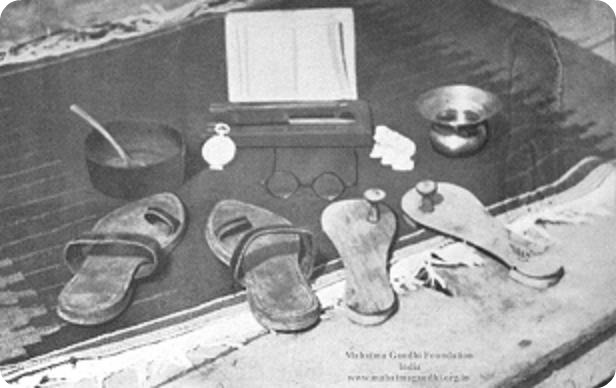
Gandhi’s Accumulated Lifetime Possessions
I’m certainly not as selfless or as great of a guy as Gandhi. I very much enjoy my big-screen TV and nice house, and I do think it is especially important for someone to earn enough money to provide themselves and their families with the necessities of life, including health and life insurance, an emergency fund, retirement income, and the occasional fun experiences that can add real spice to your life.
But as someone who has slept on a couch or a small mattress on the floor for much of my college years so as to not rack up too much debt, and taken buses at a time when most of my friends had cars, and pulled numerous coupons out of my pocket at various times in my life, I can tell you from firsthand experience that you really don’t need very much in life to be extremely happy.
SHAREABLE LIFE LESSON:
Don’t ever spend beyond your means to try to impress others. It is not a recipe for lasting happiness.
I want to make it clear that although I do have some very valuable self-help insights that I can share with you to dramatically improve your life, I do not claim to be some perfect, all-knowing guru. Like every human, I have my knowledge blind spots and cognitive biases too.
Sometimes my lessons will not just be instructive advice to you; they will also act as important reminders to myself.
And I still have some self-improvement-related subjects that I struggle with to this day. For example, despite my mostly positive, second-time-around, stand-up experience, I still haven’t completely nailed my fear of public speaking. I may still be prone to some Cindy Brady-like, deer-in-the-headlights, anxious public speaking moments in my future.
But the difference is that if I want to master that difficult (at least for me) skill, I now know exactly how to do so.

Ask her how you to get to Carnegie Hall. She knows.
It’s the same way you get to Carnegie Hall:
Practice!
That’s also the same way to get better at learning, writing, and teaching.
So as I keep studying, I will keep getting smarter, and will keep providing you with even better advice.
The more blog posts I write, the better they will probably be. The more YouTube videos I make, the better they will probably be. The more books, podcasts, or whatever I create in the future, the more likely it is that they will just keep improving over time.
So let’s grow together.
Let’s learn together.
Let’s commit to taking action together.
Which finally brings us to the most important underlying question you probably have regarding my identity.
Why Should I Take Self-Help Advice From You?
Good question.
My answer:
Because I believe that I have very good advice to give. Period.
But you will be the ultimate judge of that. (You’ve probably already started as I have been sprinkling numerous pieces of advice throughout this “About” page.)
Actually, I think you should read self-help advice with a very skeptical eye. Most of it is utter garbage (or worthless drivel). You should always be questioning if what you are reading makes logical sense or is supported by evidence. You should guard yourself against advice that sounds good, but is based on nothing more than wishful thinking.
The advantage that you have with me is that I am a person who is absolutely devoted to the scientific method.
But don’t take my word for it. Test my advice!
If I suggest something that isn’t too dangerous or onerous to try, give it a shot and see if it works for you. I wholeheartedly believe that (within reason) people should treat their lives more like scientists treat their research.
Experiment more. Take more actions. Vary your actions and study your results. Let those results guide your future actions until you stumble upon the best solutions.
This is how great scientific breakthroughs come to fruition.
This is also how great lives are designed.
If you have read my lengthy bio, you now know me fairly well.
I believe that because of my unique life experiences, I bring quite a lot to the table. For one thing, I’ve had a lot of time to discover, contemplate, and experiment with what works and what doesn’t. I have voraciously studied topics like psychology, personal finance, performance, success, happiness, and wellbeing (to name a few). But I have always come to these subjects with a scientific mindset.
Unfortunately, most popular advice around these topics involves nothing but junk science and wishful thinking. Having become frustrated by the fact that so many people yearn for accurate knowledge and constructive advice on how to improve their lives along these lines, yet are met by popular advisors who teach the exact opposite, I finally decided that I should add my voice to the mix.
So you can think of me as a smart friend who has had the luxury of time to do the self-help research and homework for you. You can take advantage of this fact by letting me share with you what I’ve learned. Just as I could surely learn from you anything that you are an expert at that I’m not.
I have also had some unique vantage points from which to make astute observations about life.
For one thing, my successful Hollywood, poker, and stock market backgrounds make me uniquely well-suited to understand something that many self-help gurus are utterly clueless about, which is the simple fact that that having a positive mindset, working hard, developing skills, and taking action must all also interact with the elements of random chance (i.e. luck) in this world.
“Paul Newman taught me that any successful person in any field who discusses their career and doesn’t include the word luck is a liar.” – Larry King
“I’m not saying that there isn’t talent involved, but there is an enormous factor of luck. So I’ve kinda lucked out, really.” – Julia Louis-Dreyfus
If you don’t learn how to navigate around all the lucky and unlucky breaks you will encounter in life, you will never understand how best to succeed. (If you want to get a headstart on this understanding, besides reading Book #9 on my list of the top self-help books of all time, also check out Outliers by Malcolm Gladwell.
Yes, you surely create many of your own breaks, (and the weighting that luck has as a factor can vary greatly depending on which particular career you choose to pursue; it’s much greater in acting than in dentistry, for example,) but you must also regularly react to breaks that are beyond your control, and this is one of the most important skills in life to master.
I believe that I understand and can teach you this skill much better than most (along with hundreds of other lessons).
So let’s answer the questions that are even more important to your life. Forget about who I am. Let’s think about:
Who are YOU? What do YOU want to do with your life? And what can YOU learn from this website?
- Are you really ready to change your life?
- Are you willing to do the hard work that might be required?
- Are you ready to learn some lessons that might take longer than a 30-second blog post or a 5-second tweet?
- Are you willing to actually do things to improve your life when everyone else around you is merely talking about doing things to change theirs?
If you are, then you have found the right place.
If not, thanks for visiting, but I’m afraid this site is not for you.
So if you are up to the challenge, my final request is that you now take a moment to sign up for my free useletter if you haven’t done so already. This way you won’t miss out on any of the important free lessons that I develop for you. I call it a “useletter” because I fill it mostly with information and bonus material that you can “use” to change your life. (Seriously, do it right now. It only takes 2 seconds! Plus, I have a special, exclusive lesson you will love waiting for you on the other end.)
Yes, I Want Useful And Inspiring Life Lessons!

Final Thoughts
Time does not stand still.
Your future is coming whether you like it not.
But your future is not set in stone. There are an infinite number of possible futures that you can create for yourself.
Which one of them are you going to create?
What is your future life really going to be?
The decisions you make today and the commitment you make to your future is what will make all the difference.
I can’t tell you how grateful I am that you have spent such a significant amount of time getting to know me and this website. You know me much, much better now. And simply by the fact that you are obviously very interested in taking steps to improve your life, I know some important things about you too.
So we’re in this together. You and me.
Let’s see if we can figure out how to steer this rocket ship called life.
Let’s discover where it will take us.
I must admit; I’m pretty optimistic about our prospects.
The only question is:
Are you?

